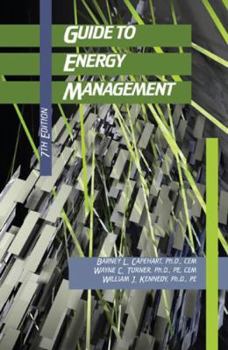Guide to Energy Management
Select Format
Select Condition 
Book Overview
Completely revised and edited throughout, this latest edition includes new chapters on creating green buildings and web-based building automation controls along with a comprehensive revision of the... This description may be from another edition of this product.
Format:Hardcover
Language:English
ISBN:1439883483
ISBN13:9781439883488
Release Date:August 2011
Publisher:Fairmont Press
Length:651 Pages
Weight:2.24 lbs.
Dimensions:1.5" x 6.3" x 9.2"
Customer Reviews
2 ratings
A Good Introduction to the Subject
Published by Thriftbooks.com User , 16 years ago
This text was used in the fall of 2007 by my university professor to teach a graduate level engineering class on building energy auditing, reduction, and management. The professor taught a fair amount of material from his own notes. Although somewhat incomplete, I believe he indicated this book was the best text he could find on the subject. The authors do a good job of explaining the intricacies of energy billing, illustrating economic analyses of energy usage, and showing examples of evaluating options for the reduction of energy consumption with supplied / assumed data. However, this subject area is broad and crosses a number of fields, including mechanical, electrical, industrial, construction, and control engineering, as well as economics. Human factors, design codes, safety, and liability issues are also involved. Entire books have been written on some subjects that are covered in a few pages or a chapter of the text. Regardless of the previous reviewer's opinion, I regard this text as an overview of the subject. For those reasons, persons who actually want to conduct this work will probably require references from the American Society of Heating, Air Conditioning, and Refrigeration Engineers (ASHRAE) and the Illuminating Engineering Society of America (IES) as well as this text. At a minimum, access to the ASHRAE handbooks, IES lighting publications, and good books on HVAC control theory and electrical power quality issues will be needed. These references are required to perform in depth studies with regard to estimating energy usage, requirements, and modifications. Computer software (not supplied) to calculate building heating and cooling loads should also be considered necessary. Though perhaps beyond the scope of the text, a major omission is information regarding how to obtain the raw data required for the analyses. Information gathering for the purpose of making the required computations and assessing alternatives is no small task in itself. A fair amount of field work requiring physical observations and measurements will be needed to do any credible analysis. Thus, persons conducting this work ought to have an appropriate background (working knowledge, if possible) and a good understanding of the design and construction of the structures, machines, and systems involved. Moreover, they should possess hands-on technical capability to operate, measure the performance, modify, and adjust the mechanical and electrical systems involved. It is quite feasible for the energy analyst to hire qualified individuals to do this work for him. Nevertheless, the analyst needs to direct the efforts of the technician, know the right questions to ask, and be able to critically assess the test methodology, data, and the results.
Very specific, very technical - and very useful for any actively involved in energy management syste
Published by Thriftbooks.com User , 18 years ago
The fifth updated edition of GUIDE TO ENERGY MANAGEMENT represents a fully revised edition for energy managers considering strategies to improve lighting, combustion, and more. Articles aren't light overviews but come from some of the leading energy professionals in the industry, discussing energy management topics ranging from HVAC optimization to improving operations and efficiency ratings of equipment, understanding power factors and energy usage and bills, and fuels and mixtures. Very specific, very technical - and very useful for any actively involved in energy management systems. Diane C. Donovan, Editor California Bookwatch






